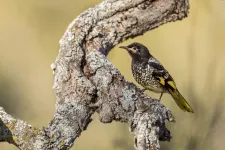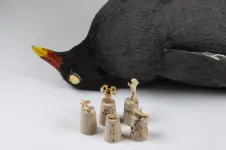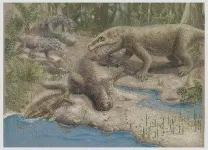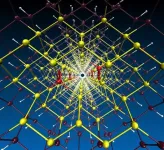INFORMATION:
The study is published in the journal Proceedings of the Royal Society B.
Trouble for honeyeaters that sing the wrong song
2021-03-17
(Press-News.org) The critically endangered regent honeyeater is losing its "song culture" due to the bird's rapidly declining population, according to new research from The Australian National University (ANU).
Just like humans learning to speak, many birds learn to sing by associating with older birds of the same species. They risk losing this skill if adults become too rare. And if they don't learn to sing a sexy enough song, their chances of mating are reduced.
"If endangered birds are unable to learn how to sing correctly, it seriously impacts their ability to communicate," lead author Dr Ross Crates said.
"It could also be exacerbating the honeyeater's population decline, because we know a sexy song increases the odds of reproduction in songbirds. Females will avoid males that sing unusual songs."
The study found that in places where there were still reasonable numbers of regent honeyeaters, males sang rich and complex songs. Where the birds were rare, males sang simplified or "totally incorrect" songs.
"For example, 18 male regent honeyeaters - or around 12 per cent of the total population - were only able to copy the songs of other bird species," study co-author Dr Dejan Stojanovic said.
"This lack of ability to communicate with their own species is unprecedented in a wild animal. We can assume that regent honeyeaters are now so rare that some young males never find an older male teacher."
The study also showed regent honeyeaters born in captivity have totally different songs to wild birds.
The research team believe this could prove crucial when it comes to conservation.
"The unusual songs of captive-bred birds could reduce their attractiveness to wild birds when they are eventually released," Dr Crates said.
"So we've devised a new strategy to teach young captive regent honeyeaters to sing the same song as the wild birds by playing them audio recordings.
"Loss of song culture is a major warning sign the regent honeyeater is on the brink of extinction and we still have a lot to learn about how to help them."
ELSE PRESS RELEASES FROM THIS DATE:
Patients value staff dedication most when evaluating substance use treatment facilities
2021-03-17
Machine learning can be used to comb through online reviews of substance use treatment facilities to home in on qualities that are important to patients but remain hard to capture via formal means, such as surveys, researchers from the Perelman School of Medicine at the University of Pennsylvania show. The researchers found that professionalism and staff dedication to patients were two of the top qualities that could be attributed to either a negative or positive review of the facility. Findings from this study were published today in the Journal of General Internal Medicine.
"Searching ...
Extinct Caribbean bird's closest relatives hail from Africa, South Pacific
2021-03-17
GAINESVILLE, Fla. --- In a genetic surprise, ancient DNA shows the closest family members of an extinct bird known as the Haitian cave-rail are not in the Americas, but Africa and the South Pacific, uncovering an unexpected link between Caribbean bird life and the Old World.
Like many animals unique to the Caribbean, cave-rails became extinct soon after people settled the islands. The last of three known West Indian species of cave-rails - flightless, chicken-sized birds - vanished within the past 1,000 years. Florida Museum of Natural History researchers sought to resolve the group's long-debated ancestry by analyzing DNA from a fossil toe bone ...
New study investigates how life on land recovered after "The Great Dying"
2021-03-17
SAN FRANCISCO (March 16, 2021) - Over the course of Earth's history, several mass extinction events have destroyed ecosystems, including one that famously wiped out the dinosaurs. But none were as devastating as "The Great Dying," which took place 252 million years ago during the end of the Permian period. A new study, published today in Proceedings of the Royal Society B, shows in detail how life recovered in comparison to two smaller extinction events. The international study team--composed of researchers from the China University of Geosciences, the California Academy of Sciences, the University of Bristol, ...
The city formula
2021-03-17
(Vienna, March 17, 2021) When complex systems double in size, many of their parts do not. Characteristically, some aspects will grow by only about 80 percent, others by about 120 percent. The astonishing uniformity of these two growth rates is known as "scaling laws." Scaling laws are observed everywhere in the world, from biology to physical systems. They also apply to cities. Yet, while a multitude of examples show their presence, reasons for their emergence are still a matter of debate.
A new publication in the Journal of The Royal Society Interface now provides a simple explanation for urban scaling laws: Carlos Molinero and Stefan Thurner of the Complexity Science Hub Vienna (CSH) derive them from the geometry of a city.
Scaling laws in ...
UK variant spread rapidly in care homes in England
2021-03-16
The UK variant of SARS-CoV-2 spread rapidly in care homes in England in November and December last year, broadly reflecting its spread in the general population, according to a study by UCL researchers.
The study, published as a letter in the New England Journal of Medicine, looked at positive PCR tests of care home staff and residents between October and December. It found that, among the samples it had access to, the proportion of infections caused by the new variant rose from 12% in the week beginning 23 November to 60% of positive cases just two weeks later, in the week beginning 7 December.
In the south east of England, where the variant was most dominant, the proportion increased from 55% to 80% over the same period. In London, where the variant spread fastest, ...
Young adults in a 20-year-long study shed light on what matters for mental health of ethnic diverse youth
2021-03-16
Washington, DC, March 16, 2021 - A study in the Journal of the American Academy of Child and Adolescent Psychiatry (JAACAP), published by Elsevier, reports on the young adult assessment of the now 20-year longitudinal Boricua Youth Study (BYS), a large cohort that brings much needed insight about development and mental health of children from diverse ethnic background growing up in disadvantaged contexts.
The present article, with its companion report on prevalence of conditions and associated factors, provides an update on the study's fourth wave, which follows-up two probability-based population samples of children of Puerto Rican heritage. ...
FSU researchers discover how 'cryptic species' respond differently to coral bleaching
2021-03-16
Certain brightly colored coral species dotting the seafloor may appear indistinguishable to many divers and snorkelers, but Florida State University researchers have found that these genetically diverse marine invertebrates vary in their response to ocean warming, a finding that has implications for the long-term health of coral reefs.
The researchers used molecular genetics to differentiate among corals that look nearly identical and to understand which species best coped with thermal stress. Their research was published in the journal Ecology.
"Being able to recognize the differences among these coral species that cannot be identified in the field -- which are known as 'cryptic species' -- will help us understand new ways ...
Catching electrons in action in an antiferromagnetic nanowire
2021-03-16
The electron is one of the fundamental particles in nature we read about in school. Its behavior holds clues to new ways to store digital data.
In a study published in Nano Letters, physicists from Michigan Technological University explore alternative materials to improve capacity and shrink the size of digital data storage technologies. Ranjit Pati, professor of physics at Michigan Tech, led the study and explains the physics behind his team's new nanowire design.
"Thanks to a property called spin, electrons behave like tiny magnets," Pati said. "Similar to how a bar magnet's magnetization is dipolar, pointing from south to north, ...
The potential economic impact of volcano alerts
2021-03-16
The Volcano Alert Level (VAL) system, standardized by the United States Geological Survey (USGS) in 2006, is meant to save lives and keep citizens living in the shadow of an active volcano informed of their current level of risk.
A new study published in Risk Analysis suggests that, when an alert remains elevated at any level above "normal" due to a period of volcanic unrest, it can cause a decline in the region's housing prices and other economic indicators. Because of this, the authors argue that federal policymakers may need to account for the effects of prolonged volcanic unrest -- not just destructive eruptions -- in the provision of disaster relief funding.
A team of geoscientists and statistical experts examined the historical relationship ...
How to prevent short-circuiting in next-gen lithium batteries
2021-03-16
As researchers push the boundaries of battery design, seeking to pack ever greater amounts of power and energy into a given amount of space or weight, one of the more promising technologies being studied is lithium-ion batteries that use a solid electrolyte material between the two electrodes, rather than the typical liquid.
But such batteries have been plagued by a tendency for branch-like projections of metal called dendrites to form on one of the electrodes, eventually bridging the electrolyte and shorting out the battery cell. Now, researchers at MIT and elsewhere have found ...




